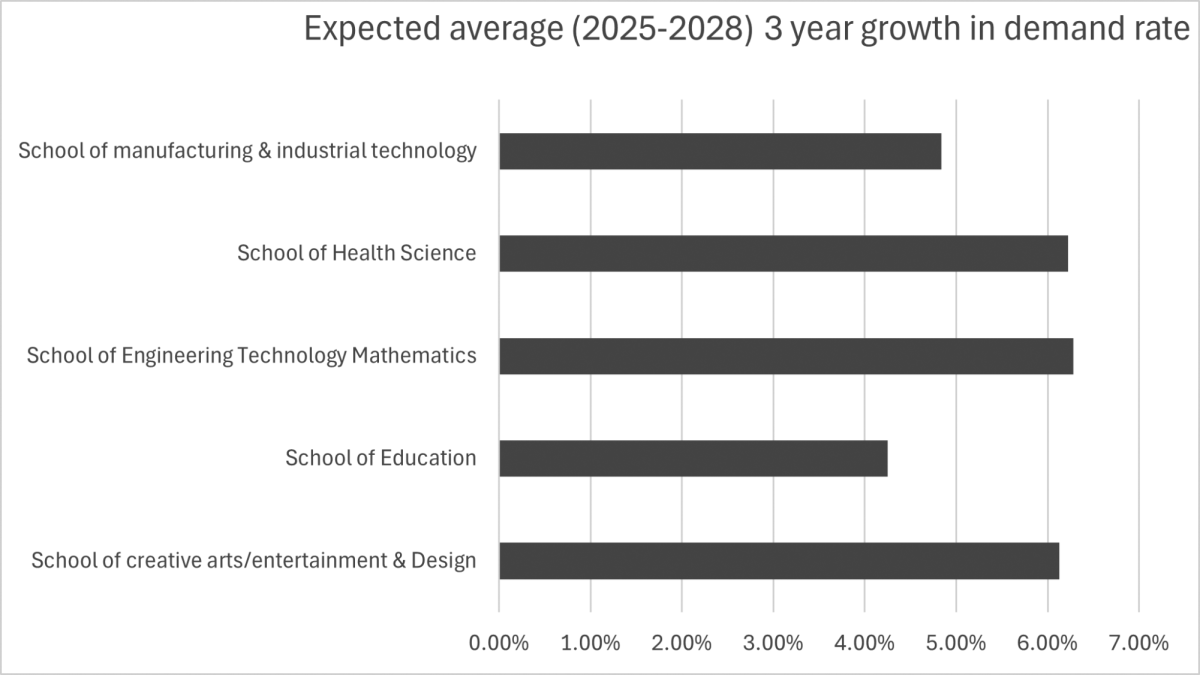Choosing a college major isn’t just about passion, it’s also about sustainability and long-term career growth. Students often ask themselves a crucial question: “Will this lead to a good job?” To help answer that, Dallas College created the Labor Market Intelligence Center (LMIC), a resource designed to connect education with opportunity.
LMIC provides interactive dashboards and detailed reports on fields of study to help students and community partners better understand the local job market. Updated quarterly with the latest data from sources like the Bureau of Labor Statistics, Texas Labor Market Intelligence and several federal and state sources, these tools offer insights into job growth, wage estimates and high-demand occupations.
Users can filter results by degree type, such as certificate, associate, or bachelor’s levels, allowing them to see specific career outcomes based on their educational goals.
“The schools of instruction dashboard is something my team updates at least once a quarter, because that’s when labor market data is refreshed by the Bureau of Labor Statistics,” Deputy Chief of Economic Opportunity, Dr. Tana Hicks said. “It’s specific to our region, Dallas-Fort Worth, and includes notes, job forecasts and notable employers we’re connected to through our Employer Resource Center.”
In addition to data dashboards, the LMIC also powers the Career Coach platform, a digital tool that helps students explore career paths based on either their interests or existing skills. Users can take a short six-question assessment or a more detailed 60-question quiz to discover personalized job matches. Each result includes information on educational requirements, job availability and expected earnings.
According to LMIC data, several associate degrees offered by Dallas College standout for their earning potential. The Associate Degree in Nursing (ADN), for instance, is one of them. The curriculum emphasizes essential healthcare knowledge, clinical experience and critical thinking skills, preparing graduates for roles in a variety of medical settings.
With healthcare remaining a consistently high-demand industry, the ADN offers both job security and opportunities for growth in the field.
Another strong field is Associate of Science in Computer Information Technology. Whether students pursue programming, cybersecurity or cloud computing, the skills gained are highly relevant in today’s growing tech sector. LMIC data confirms a steady demand for IT professionals, with the added benefit of strong career advancement and specialization options.
Also notable is the Associate of Applied Science in Robotics and Industrial Automation program, which blends mechanical, electronic and computer systems training to prepare students for roles in high-tech manufacturing.
As automation continues to reshape industries, LMIC shows that demand for skilled professionals in this field is on the rise.
“My team has been really analyzing like which skills provide a premium, and how can we understand you know, when you’re working in a particular area, if you gain a skill set, will your employer provide you with a raise, or when you’re interviewing for a job, will that stand out and allow you to kind of leverage your skill set so that you can negotiate a higher salary,” Hicks said.
To support career progression, LMIC offers career ladder reports that outline potential job pathways. One example charts a journey from a cook to a food service manager, helping students visualize how skills and experience can lead to upward mobility. These reports also highlight four-year transfer opportunities, showing how coursework at Dallas College can transition into bachelor’s programs at partner institutions.
Not all meaningful careers are the highest-paying ones, and LMIC at Dallas College highlights programs that offer significant social value. The Associate of Applied Science in Education prepares students to work in a wide range of educational environments, including elementary schools, special education programs, after-school initiatives, and community learning centers.
While LMIC data shows that starting wages in education may be lower compared to fields like healthcare or technology, careers in education play a critical role in shaping future generations and strengthening local communities.
Similarly, an Associate of Arts in Visual and Performing Arts is another purpose-driven field. Though earnings can vary, this area fosters creativity and cultural expression and often requires entrepreneurial skills and self-direction, traits that are increasingly valuable in a dynamic job market.
As a former teacher, Hicks views this mission as deeply personal. “What I found was that my students didn’t always understand the connection between their skill set and what was available to them, that’s why this work matters, students need to see their path,” Hicks said.
With access to Career Coach and real-time labor market data, the LMIC empowers students to make confident, informed decisions about their futures.
“I think what’s really important for students to know is like the power is in their hands. You can decide based on what you understand, based on how much someone is willing to pay, who the top employers are, what the skill sets are, what your journey could be,” Hicks said.
To explore career trends, salary data, and more, visit the Labor Market Intelligence Center at www.dallascollege.edu/lmic
















